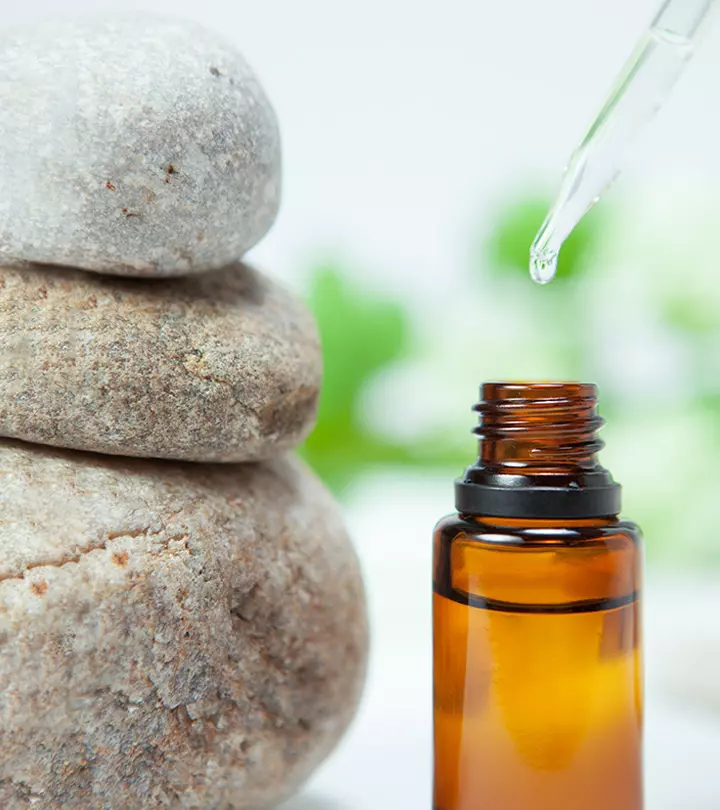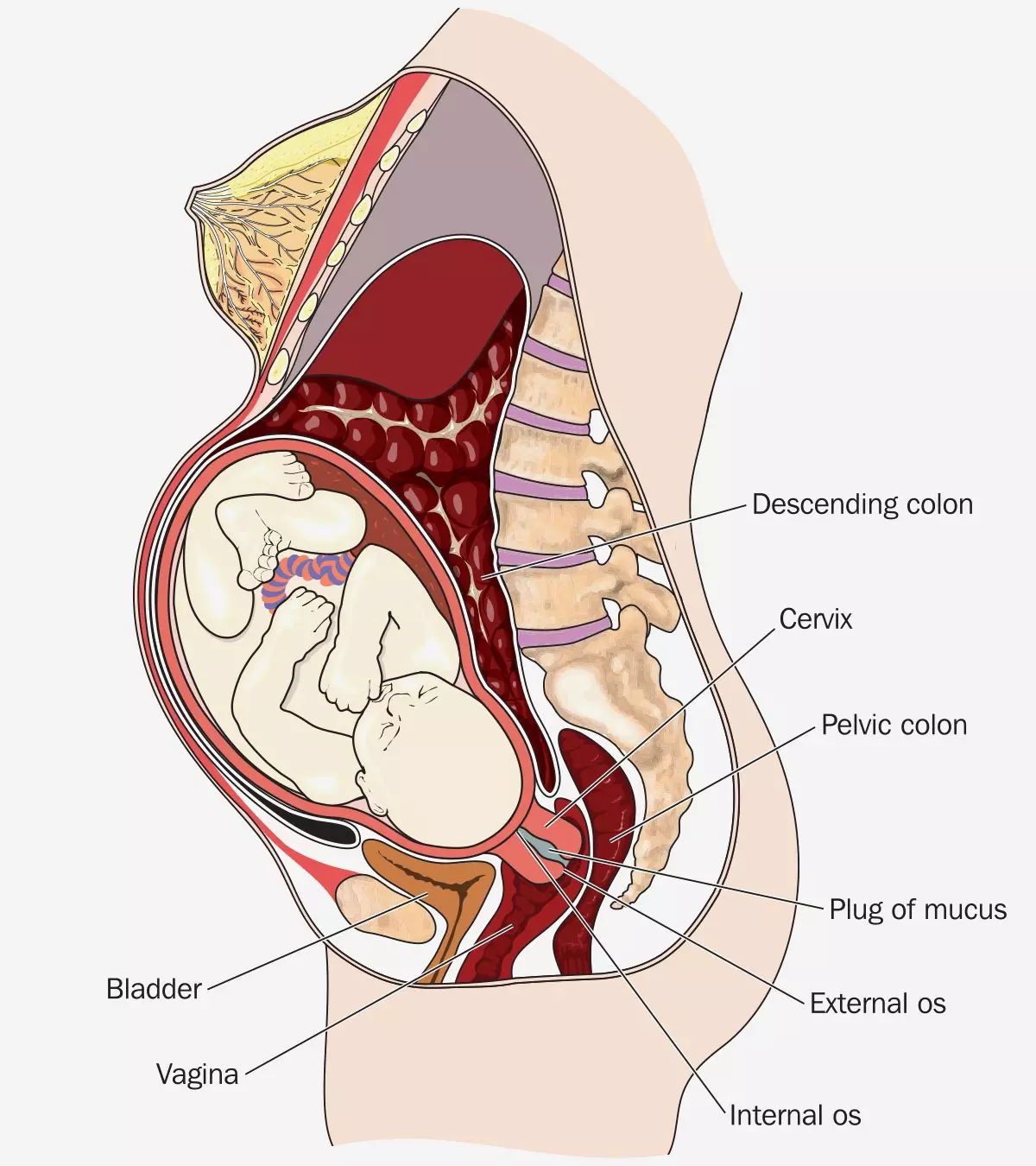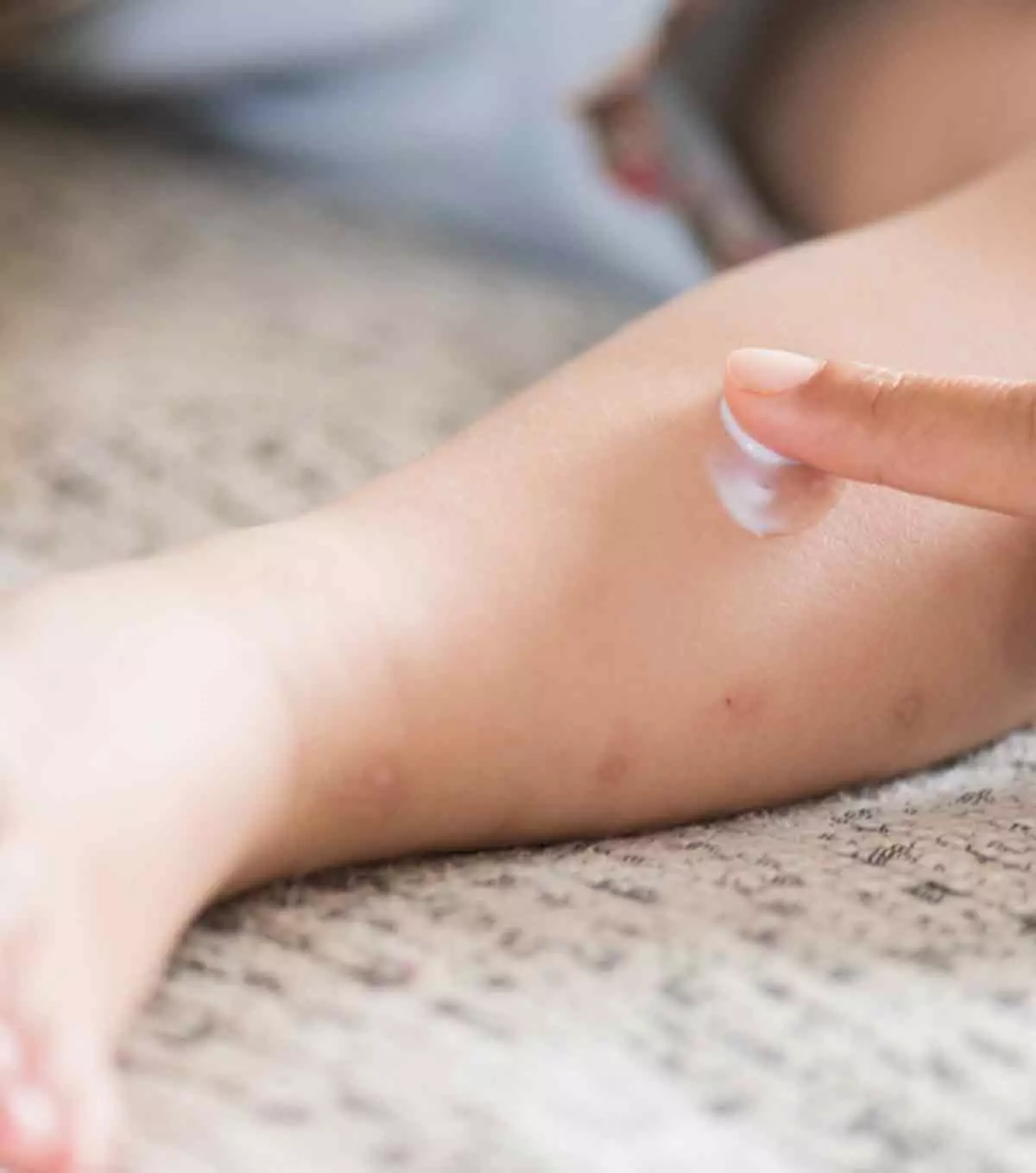
Image: iStock
Tea tree oil is an essential oil extracted from the leaves of the Melaleuca alternifolia tree native to Australia (1). Clinical evidence shows tea tree oil has antimicrobial and anti-inflammatory properties that can have therapeutic effects (2). It’s the prominent reason why tea tree oil use has been a vital part of complementary and alternative medicine for ages.

Despite its usefulness, little is known about the safety of tea tree oil in pregnancy. Besides, its use in sensitive individuals is known to cause skin irritation and allergy. Thus, the use of tea tree oil in pregnancy should be done under expert guidance.
Keep reading to know more about the safety, possible benefits, and ways to use tea tree oil in pregnancy safely.
Key Pointers
- Using tea tree oil during pregnancy is generally safe, but consult a doctor before doing so to avoid any complications.
- Using tea tree oil may help reduce acne, fight yeast infections, or treat dandruff.
- However, some women may experience burning sensation, itchiness, redness, nausea, vertigo, etc.
- Buying natural tea tree oil, reading their labels carefully, and storing them in a dark place are some precautions you may take to stay safe.
Is Tea Tree Oil Use Safe During Pregnancy?

According to the International Childbirth Education Association (ICEA), tea tree oil is generally regarded as safe for use during pregnancy (3). However, every pregnancy is different, and so are the effects of essential oils on the mother and her baby.
Thus, you should consult your doctor or an aromatherapy expert before using tea tree oil. The expert will guide you about the appropriate dosages and mode of use (topical or diffusion) based on your and your baby’s overall health and the purpose of use. It is vital to note that ingestion of tea tree oil could have toxic effects on you and your baby. Therefore, never consume tea tree oil anytime during pregnancy.
Here’s what you should know about tea tree oil use in each trimester of pregnancy.
First trimester
The first trimester of pregnancy brings several silent changes in you and your baby. Although your belly isn’t yet visible, the baby is growing, and their major body systems and organs (heart, brain, kidneys, eyes, and spinal cord) are forming and developing. It’s one of the main reasons that the first 12 weeks of pregnancy are considered sensitive (4). Therefore, several experts advise against using any natural remedies involving essential oils to avoid the potential risks of adverse effects on the baby.
 Research finds
Research findsNevertheless, you may use tea tree-based cosmetic or general skin care products, such as mouthwash or facewash, as they don’t contain tea tree oil in quantities that can harm the baby.
Second trimester
In the second trimester, both you and your baby gain rapid weight. This weight gain is primarily due to fat accumulation in the fetus and your belly, which will likely cause the essential oil to get absorbed in the skin before it reaches the baby. Besides, all the major organ developments are complete. Thus, topical application of properly diluted tea tree oil for therapies, such as massage, is possibly safe. However, to be on the safe side, you should avoid applying tea tree oil on or around your belly.
Third trimester
Most women can use properly diluted tea tree oil in the third trimester safely. You can use tree oil on your skin to treat several ailments, such as skin rashes, or use it as a part of a solution for body massage. Remember not to apply it on the belly, near the eyes, nose, and mouth. Also, you can use tea tree oil-based products, such as mouthwash or moisturizer.
Are There Any Benefits Of Using Tea Tree Oil In Pregnancy?
Tea tree oil contains several bioactive compoundsiMolecules with antioxidant properties and health-promoting found in plant-based foods , such as alpha-terpinene, alpha-terpinolene, and gamma-terpinene (5). Research shows that these compounds impart antiseptic, antimicrobial, antifungal, and antioxidant properties to tea tree oil.
It’s owing to these properties that tea tree oil use has become prevalent, even during pregnancy. If you are using tea tree oil under guidance, you may reap some of its following benefits.
- Treats minor cuts and burns: Topical application of properly diluted tea tree oil can help treat minor cuts, burns, and skin infections. Tea tree oil gets its healing abilities from its antiseptic and anti-inflammatory properties (6). If you wish to use tea tree oil on cut or bruised skin, consult a doctor or herbalist to first ascertain the safety of use.
- Reduces acne: Pregnancy causes intense hormonal changes, which may cause acne flare-ups in some pregnant women. You may consider tea tree oil to address acne. Research shows that tea tree oil possesses anti-inflammatory and broad-spectrum antibacterial properties that can help reduce breakouts to some extent (7). Hence, you can use tea tree oil for the treatment of acne under the guidance of an expert.
- Alleviate hemorrhoids: Hemorrhoids are swollen varicose veins found in the anal region. It’s a common pregnancy complication affecting up to one in every four expecting mothers (8). Clinical studies show that some products containing tea tree oil can reduce hemorrhoids (9). However, more studies are needed to prove tea tree oil’s effectiveness in treating hemorrhoids.
- Fights yeast infections: Vaginal yeast infections are common during pregnancy. The change in the vagina’s pH balance caused by hormonal changes during pregnancy is the main reason for it (10). It’s so because some studies suggest that tea tree oil can control the growth of yeasts and fungi that can cause yeast and fungal infections (11). Do note that yeast infections during pregnancy can turn severe. So, if you have a yeast infection that doesn’t improve, call your healthcare provider promptly to get a suitable treatment.
- Treats dandruff and reduces itchiness: Hormonal changes during pregnancy can cause a surge in sebumiA protective oily coating secreted by sebaceous glands (of the skin), present in the hair follicles production, resulting in dandruff. Since tea tree oil has antifungal properties, research studies assert that its use can help treat mild to moderate dandruff (2). It’s the prime reason that several hair care products, such as anti-dandruff shampoos, serums, and conditioners, contain tea tree oil as a prominent ingredient.

Besides these, tea tree oil use might offer some benefits against insect bites and stings, nail fungus, and athlete’s footiA contagious fungal infection of the feet characterized by white, itchy patches (12).
What Are The Possible Risks Of Using Tea Tree Oil During Pregnancy?
Like any other essential oil, tea tree oil use could raise the risk of allergies and skin irritation in individuals with sensitive skin (10). It’s likely to occur after topical application of improperly diluted tea tree oil. Some of the symptoms you may experience in such cases are the following.
- Dry, red, itchy skin
- Burning or stinging sensation on the affected site
Topical use of tea tree oil may trigger allergic contact dermatitisiInflammatory skin conditions caused by infections, genetics, or reaction to an allergic substance in sensitive individuals. It may cause the following symptoms (13).

- Red rash
- Swelling of the affected site
- Very itchy, dry skin
 Be watchful
Be watchfulIn severe allergy, itching can get intense and lead to blisters that can ooze and secrete fluids. Severe allergy could cause skin symptoms mentioned earlier and cause the following symptoms as well.
- Headache
- VertigoiA condition marked by loss of balance and dizziness, sometimes accompanied by nausea and vomiting
- Nausea
- Difficult breathing
Some reports claim that tea tree oil may induce uterine contractions, resulting in labor. However, there’s no clinical evidence to support this claim. Therefore, it is recommended to get your doctor’s approval before using any essential oils for pregnancy.
What Precautions Should You Take When Using Tea Tree Oil In Pregnancy?
Once your doctor approves the use of tea tree oil as a herbal medicine, follow these simple steps to ensure its safe use (14).
- Consult an alternate medicine expert. It will help you know the right dosages and appropriate methods to use tea tree oil effectively. Tell them your intent of usage clearly so that they can guide you about the right way of using essential oil.
- Buy tea tree oil from a reputed seller and manufacturer to ascertain product quality. It will also ensure you buy pure tea tree oil, free from contamination and adulteration.

- Avoid buying synthetic tea tree oil that will not have the beneficial effects of pure tea tree oil.
- Read the product label carefully to ensure the product is authentic. Look for the following details.
- Plant’s general/Latin name
- Country of origin
- Extraction method (steam-distilled or cold-pressed)
- Plant part used in oil extraction (bark, root, leaf, or flower)
- Store essential oils in a cool, dark place within tinted glass containers closed with a tight lid. Do not expose the oil to heat and direct sunlight. It will help preserve the product’s potency.
- Always use tea tree oil after thorough dilution. It’s important as essential oils are highly concentrated products that can cause skin damage if used undiluted. Mixing about 10 to 20 drops of essential oil in one ounce of carrier oil or unscented lotion is generally considered a safe dilution ratio during pregnancy (3). However, it may vary, as per your and your baby’s health. So, talk to your healthcare provider to know about the appropriate dilution ratio suitable for you.
- Beware of applying tea tree oil on severely cut or bruised skin. It may exacerbate skin irritation and lead to inflammation. Consult a doctor for first aid in such cases.
- Diffuse tea tree oil in a well-ventilated room using a diffuser for about 15 to 30 minutes at a time. Prolonged exposure to tea tree oil may make you feel nauseous, especially if you have an acute smell sensitivity during pregnancy (15).

Frequently Asked Questions
1. Does tea tree oil cause congenital abnormalities?
The topical use of tea tree oil is generally considered safe during pregnancy and presents no hazard if the dosage is correct and used appropriately (16).
2. Who should avoid using tea tree oil during pregnancy?
Pregnant women with a history of sensitive skin should avoid using tea tree oil as it is known to cause skin irritation or sensitization (16).
3. Is tea tree oil safe for use during labor and delivery?
Tea tree is generally considered safe, but its use during labor and delivery warrants medical guidance. The research on the safety and efficacy of tea tree oil for the mentioned purposes is limited. Therefore, determining its potential benefits or risks during labor and delivery is challenging.
4. Is there any evidence that tea tree oil can help reduce the symptoms of morning sickness?
There is no evidence of tea tree oil’s effectiveness in reducing morning sickness symptoms. You may speak to an alternative medicine or aromatherapy expert to gain insights into the safe use of tea tree oil during pregnancy to manage different pregnancy-related issues like morning sickness.
5. What alternative oils are safer during pregnancy?
During pregnancy, several essential oils are considered safer alternatives to tea tree oil when used cautiously and in moderation. Lavender, chamomile, sandalwood, rosemary, and eucalyptus oils are a few that are generally regarded as safer options (3). However, it’s crucial to consult with a healthcare provider before using any essential oils during pregnancy.
Tea tree oil is an essential oil often used for managing certain ailments, including skin blemishes and infections. When regarded as safe by a healthcare professional, you may apply it topically or for aromatherapy based on the intent of its use. Although there are no well-known side effects, it is advisable to use tea tree oil (after considering its safety and precautions) in pregnancy only after taking an expert’s opinion. You may refrain from using tea tree oil in the first trimester to prevent potential risks to your baby.
Infographic: How To Safely Use Tea Tree Oil During Pregnancy?
Tea tree oil is a natural essential oil that provides several benefits, such as reducing acne, treating dandruff, and treating minor cuts and rashes. However, it is important to learn its safe use during pregnancy. Check out the infographic below to learn a few tips about using tea tree oil during pregnancy.
Some thing wrong with infographic shortcode. please verify shortcode syntaxIllustration: Is It Safe To Use Tea Tree Oil In Pregnancy?

Image: Stable Diffusion/MomJunction Design Team
Are essential oils safe during pregnancy? Find out in this video, as it discusses the best uses of essential oils if you’re pregnant or in labor. Learn about its optimal uses, ensuring both efficacy and well-being.
References
- Tea Tree Oil.
https://www.nccih.nih.gov/health/tea-tree-oil - C. F. Carson et al., Melaleuca alternifolia (Tea Tree) Oil: a Review of Antimicrobial and Other Medicinal Properties.
https://www.ncbi.nlm.nih.gov/pmc/articles/PMC1360273/ - The Safe Use Of Essential Oils.
https://icea.org/the-safe-use-of-essential-oils/ - The First Trimester.
https://www.stanfordchildrens.org/en/topic/default?id=first-trimester-85-P01218 - Nikola Puvača et al., Antimicrobial, Antioxidant, And Acaricidal Properties Of Tea Tree (Melaleuca alternifolia).
https://www.researchgate.net/publication/329917219_ANTIMICROBIAL_ANTIOXIDANT_AND_ACARICIDAL_PROPERTIES_OF_TEA_TREE_Melaleuca_alternifolia - Rola M. Labib et al., Appraisal on the wound healing potential of Melaleuca alternifolia and Rosmarinus officinalis L. essential oil-loaded chitosan topical preparations.
https://www.ncbi.nlm.nih.gov/pmc/articles/PMC6746351/ - Hamid Nasri et al., Medicinal Plants for the Treatment of Acne Vulgaris: A Review of Recent Evidences.
https://www.ncbi.nlm.nih.gov/pmc/articles/PMC4740760/ - Haemorrhoids during pregnancy.
https://www.pregnancybirthbaby.org.au/haemorrhoids-during-pregnancy - N Joksimovic et al., Efficacy and tolerability of hyaluronic acid tea tree oil and methyl-sulfonyl-methane in a new gel medical device for treatment of haemorrhoids in a double-blind, placebo-controlled clinical trial.
https://pubmed.ncbi.nlm.nih.gov/22492249/ - Vaginal Yeast Infection During Pregnancy.
https://www.uofmhealth.org/health-library/hw79515 - Filomena Nazzaro et al., Essential Oils and Antifungal Activity.
https://www.ncbi.nlm.nih.gov/pmc/articles/PMC5748643/ - Tea Tree Oil (Melaleuca Alternifolia).
https://www.uofmhealth.org/health-library/tn2873spec - Allergic contact dermatitis: Overview.
https://www.ncbi.nlm.nih.gov/books/NBK447113/ - Tea tree topical.
https://wa.kaiserpermanente.org/kbase/topic.jhtml?docId=d04475a1&secId=d04475a1-Header - 3 Common and Dangerous Essential Oil Mistakes.
https://achs.edu/blog/aromatherapy-essential-oil-dangers-and-safety - Guidelines for Aromatherapists working with pregnant clients.
https://naha.org/assets/uploads/PregnancyGuidelines-Oct11.pdf - Larson D and Jacob SE; Tea tree oil.
https://pubmed.ncbi.nlm.nih.gov/22653070/ - Dosoky NS and Setzer WN; Maternal Reproductive Toxicity of Some Essential Oils and Their Constituents.
https://www.ncbi.nlm.nih.gov/pmc/articles/PMC7956842/
Community Experiences
Join the conversation and become a part of our nurturing community! Share your stories, experiences, and insights to connect with fellow parents.
Read full bio of Dr. Karla S. Sanchez-Banos
Read full bio of Swati Patwal
Read full bio of Rebecca Malachi
Read full bio of Aneesha Amonz

















